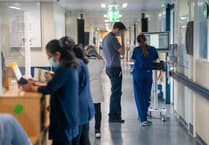I campaigned for a long-term plan for the NHS for a very long time. I tried to persuade the government to make an amendment for it in the Health Bill in November 2021, as I wrote in this column at the time.
It was also one of the main recommendations in my book Zero, in which I wrote about the urgent need to train more doctors and nurses.
So, when I became chancellor, it was one of the first things I announced, doing so in my Autumn Statement just weeks after taking on the new role.
I was therefore both happy and proud that the first plan was published last Friday and I really believe it will make a huge difference to our future healthcare.
The plan sets out the NHS’ demand-and-supply requirements over the next 15 years, as well as what is needed to make sure we meet those requirements.
It was produced by the NHS itself – and backed by the government – and is the first of its kind in any healthcare system anywhere in the world. There are three main aspects to it.
The first is training – there will be the largest ever expansion in domestic education and training places. Medical school training places will double by 2031 and there will be 24,000 more nurse and midwife training places by then as well. We will have 40 per cent more dentistry and 50 per cent more GP training places too.
The plan also sets out actions to improve the culture, leadership, and wellbeing of staff so we retain more NHS workers.
For example, we will improve flexible opportunities for people thinking of retiring and make it easier for those who have already left to come back temporarily or in flexible roles.
Over the 15-year period we will ensure 130,000 fewer staff leave the NHS.
Finally, we will modernise the way we train staff so they can come into the workforce as quickly and as effectively as possible, targeted to the areas of the country where they are most needed.
A few weeks ago I wrote here about the opportunities AI provides – and the NHS is one of those places where we can make the most of technological innovations.
There will also be a consultation on shortening medical degrees and more apprenticeship routes to becoming a doctor.
Overall, the plan could mean the NHS will have an extra 60,000 doctors and 170,000 nurses in place in the next 15 years, which will make a huge difference to our healthcare as a country.
Locally, it will be greatly helpful for the Royal Surrey, Frimley Park, Farnham, Milford and Haslemere hospitals as well as local GP surgeries.
As the NHS begins to mark its 75th anniversary, I really do think Friday was one of the most momentous occasions in its lifetime to date.




Comments
This article has no comments yet. Be the first to leave a comment.